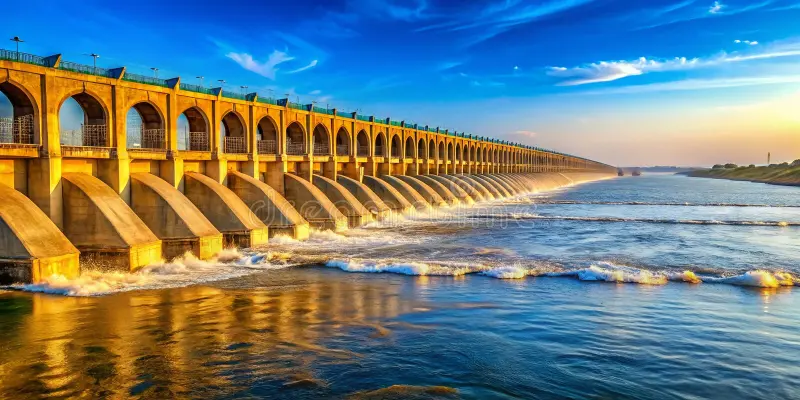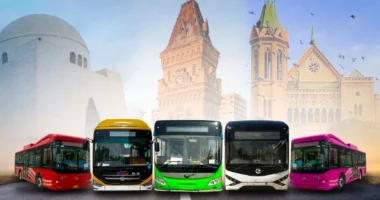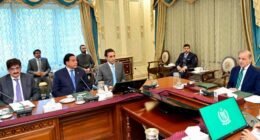
The Indus River, the backbone of Sindh’s civilization, has long been the source of life for millions. It weaves through the heart of the province, nourishing its lands, providing sustenance, and sustaining livelihoods for countless families. Yet, in recent months, this mighty river has faced an unprecedented threat. The federal government’s ambitious ‘Green Pakistan Initiative’ — which sought to divert water from the Indus to settle the arid lands of Cholistan — could have irrevocably altered the delicate balance of Sindh’s water resources.
The proposal to dig six new canals in this context threatened not only to deprive Sindh of its rightful share of water, but also risked transforming the fertile fields of the province into barren wastelands. Such a move, according to experts, would have severely undermined the agricultural fabric of both Sindh and Balochistan, displacing farmers, laborers, and entire communities. However, what the authorities failed to anticipate was the overwhelming force of public resistance that would rise in defense of the Indus and the people of Sindh.
Led by Chairman Bilawal Bhutto Zardari, the Pakistan Peoples Party (PPP) emerged as the vanguard in this struggle. As the debate around the canal project intensified, Bilawal Bhutto Zardari posed a crucial question: “Is it fair to sacrifice the future of Sindh, turning its rich lands into dust, just to settle the desert lands of Punjab?” This rhetorical question echoed through every corner of Sindh, igniting a wave of defiance that transcended political lines and brought together farmers, laborers, lawyers, students, and the working class in a united stand to protect their water rights.
In the face of this rising tide of resistance, President Asif Ali Zardari, in a joint session of Parliament, delivered a forceful statement: “We will not tolerate any monopoly over the waters of the Indus.” His words were not merely political rhetoric; they were the rallying cry for millions whose livelihoods depended on the waters flowing through Sindh’s lands.
The people of Sindh, united in their cause, took to the streets. From the coastal city of Karachi to the agricultural heartlands of Badin, Karachi, and Sukkur, slogans of defiance rang out — “Our River, Our Decision!” It was a message not only to the federal government but to all those who believed that the fate of Sindh could be dictated from faraway offices in Islamabad. This was more than a political issue; it was a struggle for survival, a battle to preserve the future of Sindh for generations to come.
And in the end, the collective strength of the people of Sindh prevailed. The federal government, under mounting pressure, was forced to retract its controversial canal project, marking a monumental victory for the people of Sindh. This victory was not just a triumph for the PPP, but for every man, woman, and child who raised their voice in defense of the Indus River.
This victory, however, is not just about stopping a canal project. It is a powerful reminder that public solidarity can indeed serve as a shield against oppression. The unity demonstrated by Sindh’s people stands as a testament to the fact that when people come together for a common cause — when they unite in defense of their rights — no force can ignore their will.
The resolution to this conflict did not come through political machinations alone, but through a collective, resolute stand for the future of Sindh. As Chairman Bilawal Bhutto Zardari remarked after a pivotal meeting with Prime Minister Shahbaz Sharif in Islamabad, “No canal will be constructed without total consensus among the provinces.” This decision, which will be ratified at the upcoming Council of Common Interests (CCI) meeting on May 2, ensures that no water project affecting Sindh will be undertaken without the unanimous agreement of all concerned provinces.
Furthermore, Chairman Bilawal Bhutto Zardari underscored the importance of this joint decision, stating that “three provinces had already raised objections to the Kalabagh Dam, and today, we have made a joint decision that no canals will be built without mutual consent.” This agreement not only preserves the water rights of Sindh but also reflects the democratic spirit of collaboration and consultation, ensuring that no one province can unilaterally make decisions that affect the whole country.
Additionally, Chairman Bilawal Bhutto Zardari did not shy away from addressing external threats to Pakistan’s water rights. He condemned India’s provocative statements regarding the Indus Waters Treaty and emphasized that Pakistan would not back down. “We will raise the issue of the Indus River on public platforms and give a strong response to India’s actions,” he asserted, signaling that the protection of Pakistan’s water resources, particularly the Indus, would remain a top priority for the government.
Today, as the waters of the Indus flow through the plains of Sindh, there is a renewed sense of hope — a belief that the struggle for Sindh’s water rights is far from over, but that victory is possible when the people unite in a common cause. The PPP, under the leadership of Bilawal Bhutto Zardari, has shown that it remains unyielding in its commitment to safeguard the rights of the people of Sindh. The party has once again proven that it is not just a political entity but a force driven by the principles of justice, equality, and the well-being of the people.
Sindh has stood tall, and its victory in this battle to protect the Indus River is a testament to the indomitable spirit of its people. This is not merely a political win; it is a triumph for every citizen of Sindh, a victory for farmers, workers, and all those who rely on the lifeblood of the Indus River. It serves as a reminder to all that when people stand united, their voices cannot be ignored, and their rights cannot be trampled upon. This is the power of solidarity, the strength of the people, and the unbreakable resolve to protect the future of Sindh.












